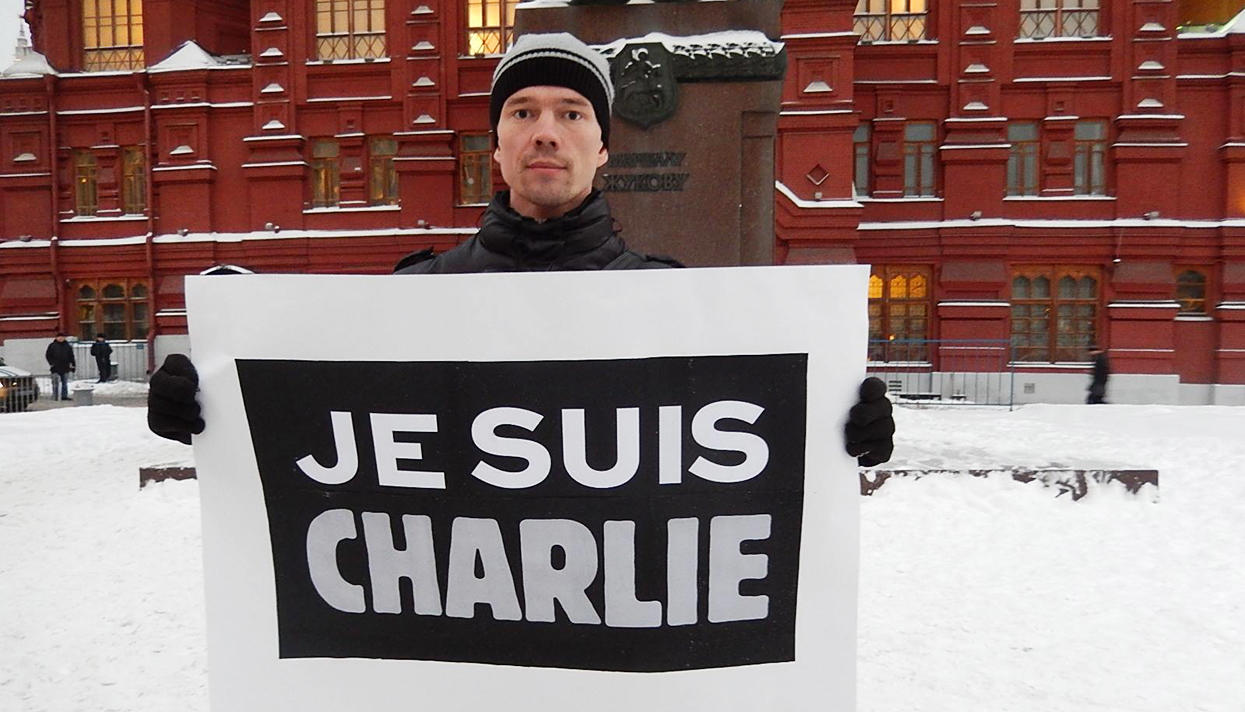On March 31, in a much anticipated appellate procedure in Moscow City Court, a judge considered the appeal of opposition activist Ildar Dadin, the first Russian citizen to be convicted under Russia's new and highly controversial law 212.1, which criminalizes "repeated violations of the rules of public gatherings." Dadin's 3-year prison sentence ultimately was reduced to 2.5 years, small comfort to his supporters who view Article 212.1 of the Russian Criminal Code as the latest repressive means by which the Putin regime is attempting to silence and punish its critics.
Human rights groups in Russia and abroad have denounced Article 212.1 as a draconian anti-protest law that contravenes both international human rights principles as well as the rights to freedom of speech and assembly expressly guaranteed in the Russian Constitution. Amnesty International's John Dalhuisen called it a way to "fast-track peaceful protesters to prison."
 In St. Petersburg, opposition activists held protests in support of Dadin. In Moscow, human rights activists released 212.1 yellow balloons with Dadin's face imprinted on them in a symbolic gesture of freedom.
In St. Petersburg, opposition activists held protests in support of Dadin. In Moscow, human rights activists released 212.1 yellow balloons with Dadin's face imprinted on them in a symbolic gesture of freedom.
https://twitter.com/PaulaChertok/status/715231326706671617
A crowd of about 100 supporters lined up outside Moscow City Court to hear Dadin's appeal. At the end of the day, even with the eloquence of prominent Russian attorney Henry Reznik who represented Dadin at the appeal hearing, Dadin's sentence was only modestly reduced. He is still set to serve 2.5 years in a penal colony for exclusively peaceful, nonviolent expression.
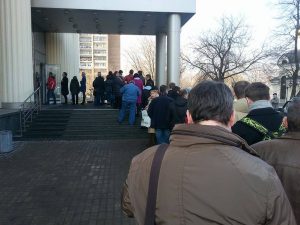
Although not unexpected, the outcome was clearly a disappointment to the many friends and observers of Russia's increasingly dangerous human rights situation since Putin returned to the presidency in 2012. That election, as well as the 2011 parliamentary elections, were marred by allegations of widespread fraud, which brought tens of thousands of Russians out into the streets. Putin ruthlessly clamped down on those peaceful "Bolotnaya Square" demonstrations of May 6, unleashing an unnecessarily hostile force of riot police who indiscriminately beat protesters wearing their delicate white ribbons. The Bolotnaya protests also ushered in a new wave of political prosecutions that still looms over Russian citizens.
Ildar Dadin has been a non-violent civic activist against the Putin regime and its policies since the Bolotnaya protests erupted in Moscow. Dadin had been detained at that time, though not one of 30 or so protesters prosecuted.
The Bolotnaya protests scared Putin to his core, apparently. He was already no fan of people power or street protests at home or abroad. He's repeatedly condemned the so-called Color Revolutions, and denounced the Arab Spring movements. There are rumors that he obsessively watches video of Libya's captured and humiliated leader Moammar Ghaddafi. Many have suggested Putin's own personal traumatic history working as a KGB operative in Germany in the chaotic days when the old world order of the Soviet Union and the Berlin Wall were collapsing in his midst as the source of his attitude toward street demonstrations.
So when street protests broke out in neighboring Ukraine in the fall of 2013 and winter of 2014, resulting in the ouster of the corrupt pro-Kremlin Yanukovych regime, Putin literally went ballistic. If Ukrainians could take to the streets, surely so could Russians. Putin reacted swiftly and in shocking ways, using a kitchen sink of aggression–military invasion, territorial seizure, information warfare in the West, disinformation campaign against Ukraine and any and all supporters in Russia, including Russians who opposed war. The man who claimed that the West doesn't give Russia its due global recognition was now damaging Russia's standing in the international community, all to make sure protesting demonstrators wouldn't come close to his Kremlin walls.
In record time, Putin squandered whatever good will Russian rubles had bought around the globe. At the beginning of 2014, people were partying in Sochi at the Winter Olympics. By the end of 2014, Putin's Russia was a sanctioned pariah state who not only flagrantly violated international laws and agreements but continued to deny any involvement in Crimea and Ukraine despite reams of evidence to the contrary. Russian aggression in Europe, including the tragic deaths of 298 innocent people in the down Malaysian Airlines Flight MH17 over Russian-held territory, had many reevaluating what they thought they knew and understood about Russia and its leader.
Inside Russia, those who could see through the propaganda and lies on state-run TV were horrified that their country had embarked on an aggressive war, and on their closest cultural and geographic neighbor no less. Many families in Russia share both Russian and Ukrainian heritage, so the vilification of Ukraine was particularly loathsome and unconscionable. Instead of quelling anti-government sentiment, Putin's war in Ukraine actually increased criticism of Putin's regime among Russia's opposition activists.
Mass anti-government protests became anti-war and anti-aggression protests. Led by Russian opposition leader Boris Nemtsov, tens of thousands of Russians courageously took to the streets to voice their opposition to Putin's policies in Crimea, just as Putin was gloating proudly about his coup in "returning" Crimea to the Motherland. While the Kremlin whipped up patriotic Crimea fever, Putin's critics didn't wait for the next mass protest. They went out onto the streets on their own, in the peculiarly Russian, emasculated "single-person picket" protest, in which a protester has an ostensible right to free speech but not to free assembly. There was no law against it. Until there was.
In July 2014, in response to the March protest and growing criticism of Russia's war in Ukraine, Russia's Duma hastily passed Article 212.1, amending previous laws restricting public speech and assembly, making for the first time in modern Russian history, administrative violations of unsanctioned "public gatherings" into criminal offenses, punishable by up to 5 years in prison. The law took effect in January 2015.
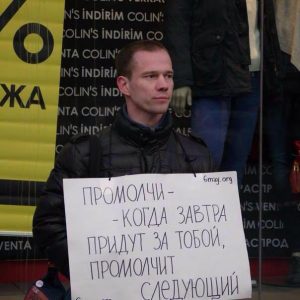
On August 6, 2014 Ildar Dadin protested in support of imprisoned Bolotnaya protesters. On August 23 and September 13, he protested against the government's actions in Ukraine (including in support of kidnapped pilot Nadiya Savchenko), and on December 5, he and 7 other protesters walked down a street in Moscow with a banner that read "Yesterday – Kiev, Tomorrow –Moscow." Dadin was cited in 3 of these actions and received administrative punishments, including fines and house arrest.
Even though Dadin had already been legally punished for those administrative code violations, the new statute allowed the government to use those same violations as the basis for the considerably more severe prosecution under the draconian anti-protest Article 212.1. And so, on December 7, 2015, Judge Natalya Dudar convicted Dadin of "repeat violations of public gatherings" and sentenced him to 3 years in prison before a stunned courtroom. Ildar Dadin became the first Russian citizen to be sentenced to a substantial prison term – 3 years – for the crime of peaceful expression. Though the prosecutor had only recommended 2 years, the judge was unmoved.
It turns out that Dadin's trial judge, Judge Natalya Dudar, is well-known and notoriously unsympathetic to opposition activists. She was the judge who regularly extended the detentions of Bolotnaya defendants in 2012-13. She also appears on Novaya Gazeta's Aleksanyan List as one of those responsible for contributing to the death of a vice-president of YUKOS, Vasily Aleksanyan, who was dying in prison yet was denied treatment, despite 3 injunctions from the European Court of Human Rights.
Appellate Judge Natalya Borisova's attitude toward Dadin wasn't much different from Judge Dudar's. From the very beginning, when Dadin argued a bit clumsily and a bit repetitively, as described by Ilya Azar of Meduza, via video link that his rights were being violated by the court's refusal to allow him to appear in person at his appeal, Judge Borisova appeared exasperated with Dadin and did little to hide her disdain.
I can't imagine the indignity and loneliness Ildar Dadin must feel to be behind bars to begin with. But I do know that preparing physically and mentally for a court appearance is a big deal, one that courtroom participants look forward to for a variety of reasons. For a defendant, who's lost his precious freedom, appearing at a hearing at the very least gives him an incomparable opportunity to be in the presence of supporters and friends. It's a shame that the Russian court felt the need to take even that little bit away from its victim. Instead of sitting in a cage in a room with familiar faces nearby, Dadin sat alone, enclosed behind bars in a small sterile green prison cell. Talk about depriving one of one's humanity. I'd give the guy a break if he appeared somewhat clumsy, nervous or repetitive.
But Dadin didn't get any breaks. After Judge Borisova read through her formal procedure, she asked Dadin, "Is everything understood, Dadin?" He replied, "No, actually, it's not. I don't understand why I can't participate in the examination of evidence and be present in court."
Over the next two hours, petition after petition was presented by Dadin, and each was rejected by the judge, often in a contentious and derisive manner.
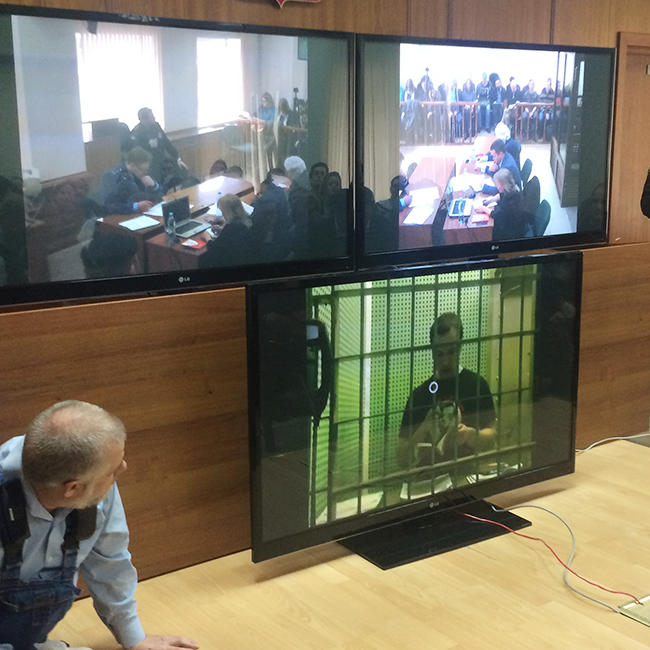 Dadin stated, "Physically keeping me from court denies me my constitutional rights. You could judge me on video if I had completely lost faith in the process, and if I specifically asked you to do so. But I'm still going to defend myself in court."
Dadin stated, "Physically keeping me from court denies me my constitutional rights. You could judge me on video if I had completely lost faith in the process, and if I specifically asked you to do so. But I'm still going to defend myself in court."
Dadin spoke for over an hour, referring to at least 2 dozen provisions of the Russian Constitution and Russia's Code of Criminal Procedure which according to Dadin the judge had violated by not allowing him to be present at his own appeal hearing. Among the provisions he cited were Article 48 of the Russian Constitution stating that parties are to appear equal in court proceedings and the Constitution's guarantee that defendants have the right to "complete" legal assistance. He also stated that the court was in violation of Article 17 of the Constitution which guarantees that "fundamental human rights and freedoms are inalienable and belong to everyone from birth."
Dadin continued. "You have violated my right to confidential communication with my lawyers. It's disrespectful and uncomfortable and disadvantages me every time you have to clear the courtroom in order for me to talk to my lawyer. And, at the very least, it's uncivilized." Azar described a scene with Dadin repeating himself, a bored prosecutor, and attorneys seeming visibly uncomfortable.

When it was the lawyers' turn to speak, Henry Reznik began. He stated that a defendant's participation by video would be called for if there were no possibility a defendant could be delivered to the courtroom. But he noted he was "not aware of any circumstances that would prevent the delivery of our client to the courtroom." The judge rejected the petition.
"Any other petitions?" the judge asked grimly.
"Yes, of course!" an enthusiastic Dadin exclaimed.
Dadin again insisted that his personal presence in court was necessary, to be able to submit documents and evidence to the court. The judge ruled that oral requests were adequate. Dadin said nervously, "I don't understand why you didn't consider my first petition. How do I participate in the process? I've got many more documents."
Judge Borisova continued to dismiss one petition after another. Dadin asked that the proceedings be audio-recorded for accuracy. The judge denied that. He petitioned to include his wife as one of his legal representatives on the grounds that his pro-bono lawyers don't always have time to see him in prison, but his wife could communicate with him more easily. The judge denied that too. She seemed disgusted as if she just wanted to get the appeal over with.
At some point, Dadin demanded: "Since you aren't observing justice, I request that you obey the law and allow me the right to petition the court."
There were other crotchety exchanges. When Dadin started looking antsy sitting in his chair, the judge asked him to stand. "Or are you comfortable sitting?" "I'm comfortable," said Dadin. Then the judge, out of nowhere, asks, "Do you have some illness?" "No," replied Dadin. "Well, you're supposed to address the court standing!" the judge said, impatiently and harshly.
Dadin responded, "In a place where the Constitution is mocked, where unjust sentences are handed out, that's not a court I believe in," and he remained seated.
"I remind you that the judge is addressed standing," the judge repeated, trying again to get Dadin to stand.
"Oh, where's the court? Do you see a court? I'm just sitting here watching TV."
Two hours later, the court finally began considering the substance of Dadin's appeal, which was appealed on the grounds that his conviction and sentence violate both the Russian Constitution and the European Charter of Human Rights.
Dadin's lawyer Ksenia Kostromina said, "I am convinced that this Article [212.1] is absolute nonsense since it is clearly contrary to the Constitution. All of the episodes for which Dadin has been convicted have already been punished as administrative offenses... Dadin was prosecuted for non-violent actions without any victims. He simply went outside and expressed his personal views. Moreover, the judge sentenced him to 3 years even though the prosecutor had only asked for 2, again demonstrating that the court is not impartial."
She also stated that the court failed to consider the fact that Dadin had no prior criminal record, nor did he have any negative personality traits. Therefore, "to deprive him of his liberty contravenes constitutional rights and is a flagrant violation of human rights."
At this point Dadin announced that he had yet another petition. "I want to make a request. I demand that the court consider these two diagrams. They are necessary for my case, but I can see on the TV that you are not looking at them," and he holds them up closer to the cameras.
Dadin's lawyer Kostromina interjected, probably hoping to do the talking for him, "Refusal to study these diagrams is a violation of my client's rights. We again contend that our client's absence from this court violates his rights."
Dadin went on, "I still have a lot of evidence here that I cannot pass on to the court. How am I supposed to pass them to you, through telepathy?"
The judge rejected the diagrams. Dadin then began making the following statement:
I believe this sentence to be political, criminal and false in finding me guilty under the unconstitutional and illegal article 212.1, which expressly repeals the right of citizens to peaceful assembly. I've said from the start that my actions have all been legal, and that Judge Natalya Dudar is obviously a criminal and holuyka regime...All my public actions were peaceful and without weapons. I am a principled advocate for nonviolent resistance to Putin's illegitimate fascist and authoritarian regime. Judge Dudar did everything possible to put me away, and I will do everything I can to reveal the zombies in judges' robes who treat innocent people as criminals. They shouldn't assume that the regime will be around to cover up their unlawful decisions forever...
From a legal point of view, there is no evidence of my guilt. The three actions happened after [the criminal case], so even under your outlaw narrative, I am not guilty. This is a direct violation of Article 54 of the Constitution which states that no one should be held liable for an offense which at the time of its commission was not regarded as criminal.
This is a technical but important legal argument. What Dadin means is that at the time of the criminal proceedings, a decision on the 3 administrative violations had not yet entered into force. But the stronger legal argument is that Dadin was actually convicted and punished twice for the same act, a kind of double jeopardy, something expressly prohibited by Article 50 of the Russian Constitution.
When the judge announced a break for lunch, Dadin shouted out, "Thank you to everyone who came! I love you all, especially my girl." At that Zotova, his wife – Dadin and Zotova married after he was sentenced – walked to the TV screen and blew kisses to her husband in jail. The sound had already been turned off in Dadin's cell, so he couldn't hear anything, but he could see the kisses and the crowd of supporters in the courtroom.
Witnesses described that about 100 people came to Dadin's appeal hearing. Many held up notebooks and signs with "Free Dadin" written on them. There were also supporters of Nadiya Savchenko, the Ukrainian pilot recently sentenced to 22 years in a political show trial in Rostov. Others wore Ukrainian symbols and colors of the Ukrainian flag, including Vasily Nedopekin, who was apparently kicked out of his parents' home for supporting Ukraine and Savchenko. And Dadin himself wore a black t-shirt with an image of a classic Ukrainian Cossack with a characteristic Ukrainian inscription "Slaves aren't allowed in Paradise. Glory to the Heroes."
A few well-known political figures came to support Dadin at his appeal. Maria Baronova, human rights coordinator for Open Russia, and Alexei Navalny's colleague Nikolai Lyaskin of the Anti-Corruption Fund. Baronova was optimistic. "I give Dadin 70% chance he'll be released. Our lawyers have prepared a substantial complaint to file with the Constitutional Court on Article 212.1. We can turn the place into a circus if need be, which can be avoided by releasing him," she told Azar.

When court came back into session, Henry Reznik began his argument. "The redundancy protection argument alone is enough to cancel the verdict and dismiss the case." Reznik said that "it's obvious that there are no grounds to believe an act which is recognized by the court as an administrative offense can also be considered a criminal offense. Repetition does not change the content. Using foul language in a public place, no matter now much you repeat it, is still an administrative offense. The deputies who wrote this rule sought to please what they saw as the prevailing political winds blowing, yet they wrote a law that conflicts with larger criminal and legal canons," Reznik stated confidently.
The prosecutor was brief: "None of the defense complaints dispute the factual circumstances of the case. It's hard to call the December 5 episode a peaceful demonstration. The Court took into account the nature and degree of public danger, and I do not see any basis for canceling the decision."
At this point began the debate stage of the proceedings. The parties repeated their arguments, and Henry Reznik was so convincing that the judge addressed him using the very respectful name and patronymic.
The bottom line is quite simple: a peaceful demonstrator has been put behind bars not for months, but for years. This situation is a blow to the prestige of the state, which considers itself to be legitimate. This sentence handed down by Judge Dudar is a blemish on the mantle of Russian justice. The deprivation of the liberty of peaceful demonstrators is a flagrant violation of Russia's Constitution and of the European Convention on Human Rights. The latter states that "where demonstrators do not engage in campaigns of violence, it is important that the state demonstrate a certain level of tolerance.Dadin belongs to a relatively small category of our compatriots whose beliefs include lofty ideas. It's part of their being. Dadin is one of the most deeply caring people who stand up for law and justice. It's not always pleasant to be in their company, but it is their presence that prevents civil society from becoming weak. Your Honor, look at all of his activities, these weren't mass protests. They were single pickets where he protested against various injustices...This case is of the greatest importance. It will demonstrate whether the government can tolerate peaceful forms of expression of one's beliefs, which can be extreme or delusional, but that is precisely what characterizes our regime as democratic.
Your Honor, the place for peaceful demonstrators is not behind bars. It is an insult to a person's rights.
Then Dadin made his closing statement, referred to as "last word" in Russian legal procedure. Dadin bravely delivered a sharp rebuke of Russia's judicial system as merely another political tool of Putinism.
I want to appeal to Putin's hitmen. I have often been called an idealist. But I'm also a pragmatist. And I know how to put together facts. I've seen people imprisoned who express a position against the war. Savchenko, a worthy daughter of Ukraine, was given 22 years. Even the staunchest "russist" in my prison doesn't believe she's a murderer. I understand that you have orders. My sentence will remain unchanged. But I'm not afraid. People ask me, so what have you achieved? You're in jail, after all. I have remained a human being, and this is important. I am here because I live according to my conscience.
I am not afraid to remain in prison for my full term. Because if you disapprove of Putin but don't tell his hitmen publicly that they are hitmen, but only talk about it in your kitchen, then you are responsible too. Until you go out and take a stance, you're an accomplice of fascism. If we don't grab our servants' hands and allow the hitmen to kill people, it's our responsibility. Friends, don't worry about me. I'm ready for these three years. Does it compare with what our government is doing to the people? Don't become accomplices to fascism. Stand up for your rights.
When the judge announced that she had reduced the sentence by 6 months, the room erupted into sarcastic laughter. "Shame on you, if you can hear me, you are Putin's shameful fascists. Shame on you. What a disgrace," Dadin yelled from his video screen jail cell.The crowd of about 80 supporters chanted also. "Shame on Russian justice!"
Dadin's lawyers promised to appeal the verdict with Russia's Supreme Court. Reznik added sadly, that he has more hope for the European Court of Human Rights than in Russia's courts.
Unfortunately, the case of Ildar Dadin is not the only application of Article 212.1. There are more cases of peaceful protesters in the pipeline. It's difficult enough to protest in Russia, where members of the opposition are regularly maligned, humiliated, threatened, intimidated, and assaulted. And when they do muster the courage to stand up for a cause, they must stand alone in the restrictive single-picket protester mode, silently, looking like freaks standing by themselves holding signs. Even under the best of circumstances, attempting to follow all the laws, protesters are regularly accosted by provocateurs, turning the single-picketer instantly into an unlawful assembly. Police are invariably nearby to give a citation to the picketer. And it only takes a couple more to now be subject to criminalization and prison under Article 212.1.
In this way Article 212.1 fully criminalizes the narrow band of permissible speech in Russia. And since it's evident that judges are willing to punish defendants to the max, and even beyond what prosecutors recommend, rights activists are bracing themselves and discussing strategy for dealing with the new hostile landscape for Russia's opposition posed by the enforcement of this new draconian provision.
Today, to coincide with Dadin's appeal, NGO Open Russia has launched a website precisely to educate people on the new law in order to minimize as best as possible its consequences. Knowledge is power, and this website provides an engaging instruction manual, filled with advice and commentary from well-known political figures about dealing with the initial stages of a possible violation. There are even some bios of citizens like Ildar Dadin to show readers how ordinary protesters can become victims of 212.1. Below is an excerpt, translated from the original Russian.
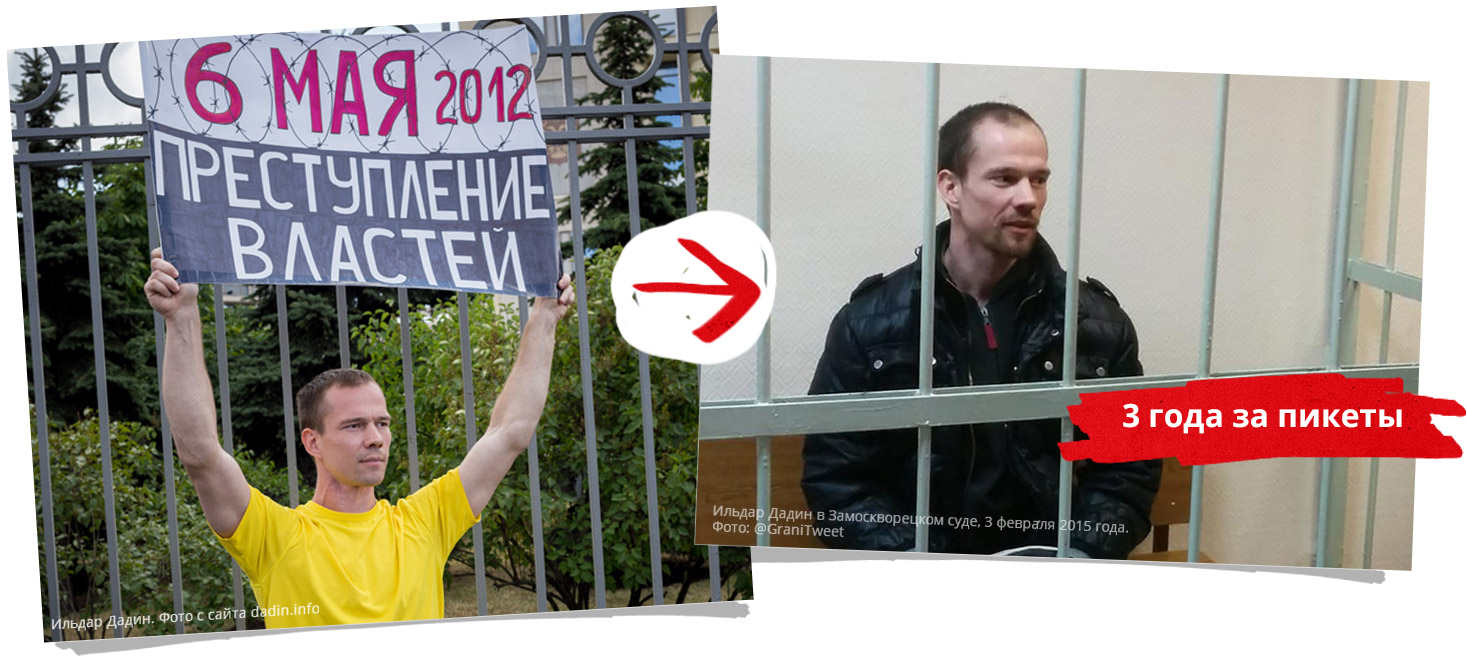 What Is Going On
What Is Going On
In 2014, the Criminal Code added a new statute - Article 212.1 ("repeated violation of the established order of organizing or holding meetings, rallies, demonstrations, marches or picketing").
It sounds scary and confusing, but it is all actually quite simple: this is the statute for which you can go to jail for up to five years, if, within six months, you gather with friends more than two times without coordinating it first with the authorities. So far people are being prosecuted for going out as single-picket protests. That's only for the time being.
This statute is based on the repeated violations of Article 20.2 of the Administrative Code. Virtually anyone can be snagged under 20.2 of the Administrative Code of the Russian Federation: it could be the artists on the Arbat, people who stand too close to one another while feeding pigeons, or friends riding a pony together. All of these are real examples of the application of 20.2. If you are charged under this statute more than two times in six months, criminal proceedings will be initiated against you.
We've collected on this website news about the people affected under this statute. Here's what we are doing to see it stopped. But in order for it to stop, you need to let everyone know that people can't be put in prison simply for expressing their opinions. You too. Because it can happen to you. See how easy it is?
Ildar Dadin was born on April 14, 1982, in the city Zheleznodorozhny (Railway).
He was serving in the Navy when he first encountered corruption: "Sailors would be given ten bags of flour, and the ship's cook would grab eight and immediately sell them. And the children would go hungry."
In 2011 Ildar heard about the violations during the Duma [Parliamentary} elections. He decided to see for himself if this was true, and became an observer at the presidential elections. As a result, he along with other observers recorded actual election violations. Ildar and his colleagues asked the police for help, but instead of helping, the police officers beat the observers. Ildar himself was driven out to the industrial zone and threatened there. Many media outlets, including "Novaya Gazeta," wrote about this incident.
Convinced that the elections were fraudulent, Ildar went out to protest. Ildar watched as the police grabbed protesters for no reason whatsoever and dragged them through the snow to toss them into a paddy wagon. That was the first time he was detained.
After this Dadin began talking with human rights activists. He started studying the laws and the Constitution and soon realized that the police often violated people's human rights. So he decided that he would stand up for those whose rights had been violated. He supported Pussy Riot and was a volunteer during the mayoral campaign of Alexei Navalny. He participated in the elections as an observer and was an advocate for the release of prisoners in the "Bolotnaya" matter.
In January 2015, he was detained on Manezhnaya Square, while trying to protect women who were being attacked by hooligans. After that, he was charged under Article 212.1 of the Criminal Code. "I was born a free man, and no thugs imposing unconstitutional laws can apply them to me. These thugs, government officials, I will hold them accountable. The state is for the citizens and not vice versa,"- said Ildar during his closing final word before his court verdict.
The judge imposed a three-year sentence in a penal colony. He is in Colony-4 ( "Bear"), where he helps fellow inmates file complaints and appeals. And he intends to challenge Article 212.1 in the Russian Federation's Constitutional Court.
How to Conduct Yourself During Interrogation
- As soon as you receive a notice of violation, immediately call a lawyer. Let him know before you do anything.
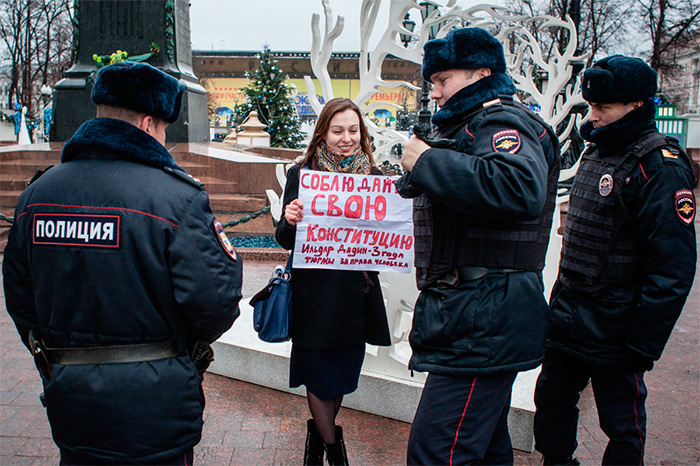
- Meet with your lawyer and discuss your position in the case. Tell your lawyer the whole truth.
- Don't hide from the investigator. Call the number on the notice and arrange for a time to be interrogated when your lawyer can be present.
If you hid, they can force you to be interrogated by their staff, which can negatively impact your case and limit your options later.
- When you go to be questioned, bring only your passport, a pen and a notebook. Leave your phone, keys, laptop, any electronics carrying information, in a safe place, so that they're not taken away as evidence.
- During the interrogation, you have the right to speak with your lawyer in private. You can receive advice from your lawyer in the presence of the investigator.
If You Are Brought In For Questioning Without a Lawyer
- Keep trying to reach your lawyer. As soon as you are called in for questioning, you have the right to legal counsel under Article 16 of Code of Criminal Procedure. Be persistent and confident in asking for your lawyer.
- Without your lawyer present, don't say anything about yourself. Don't tell anyone, not the investigator or the kind-looking man in the smoking room. Explain that you have nothing to hide, but you do not have the legal knowledge and a cunning investigator can twist your words, or at the very least can play you.
Link to Article 51 of the Constitution.
No one is obliged to testify against himself, his spouse or close relatives as defined by federal law.
Discussions by Investigator on Criminal Liability Under Art. 308 of the Criminal Code for witness or victim refusing to testify because s/he has no legal knowledge. The effect of Art. 308 as significant as the effects of self-incrimination which may occur because of your being timid, and investigators could take advantage of your lack of legal expertise.
Without your lawyer, don't enter into any formal and informal "deals" with the investigation. Legal illiteracy carries a high risk of fraud.
Don't sign any documents that you don't fully understand, however much the investigator tries to persuade you.
Don't sign any documents whose content doesn't correspond to the truth/reality. If in doubt, consult with your lawyer.
Reread what you do sign at least 15 times. But really, you shouldn't be signing anything without your lawyer present.
If the investigator is in good spirits, treats you to cigarettes and seems like he's about to run out to get you a beer, then matters are very bad. If your investigator is dissatisfied, irritated, shouts and demands that you change your story, then you'll soon be free.
SUMMARY
- Don't hide
- Go for questioning only with your lawyer
- Be calm and confident
- Don't say anything or agree to anything without your lawyer
- Consult with your attorney about everything
- If you don't agree with something, do NOT sign it
- If you don't understand something, do NOT sign it
- If you do sign something, reread it 15 times, and do it in the presence of your lawyer.
What People Are Saying About 212.1

Article 212.1 reflects the overall philosophy of the changes in the criminal legislation of the Russian Federation since the return of Vladimir Putin to power in 2012. Any person on the street can be locked away for the slightest involvement in street protests. The epitome of this philosophy is seen in the Bolotnaya matter, which is still ongoing, don't forget. Usually, a person can express their disagreement with the government in conventional ways through an election, but now any real opposition isn't tolerated. And in generally, according to Putin's doctrine and 212.1, Russians must always remember this, holier than the Lord's Prayer: (a) don't renounce prison, and (b) a prison sentence is in no way related to the severity of the action/inaction.
If you want a guarantee of immunity from 212.1, then you have to not live in Russia, that's all. Article 212.1 and similar laws are intended to sow distrust among ordinary people about the professional opposition. Opposition leaders are going out to nice restaurants while you go to jail. Such ideas are planted with the full cooperation of government-run TV channels who will continue to plant such seeds.
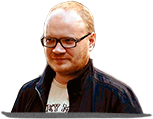
Transforming administrative matters into criminal ones based on political expediency has nothing to do with rights, even in our government. We're now debating in modern-day Russia the old dissident slogan "follow your own laws." By imposing laws that are contrary to common sense and the spirit of the law, the powers that be deprive society of the ability to follow the law. Legal nihilism is always mutual in nature. Article 212.1 in potentially depriving many law-abiding people of the ability to respect the law, and opens society to truly dark prospects.

This is how you need to read Article 212.1: Repeated expressions of citizenship shall be punished by prison. Not only does it defy common sense, but it goes against our Constitution, and that's why it should be abolished. This law, against which I voted, is trying to prevent our society from developing. It won't work.

If 212.1 had been passed earlier, Pussy Riot would not have existed. We would not have been charged with Hooliganism for our Punk Prayer of February 21, 2012 because we would have been taken away after our first street concerts in October 2011. When we performed at metro stations (Pussy Riot's debut tour "Free the pavement"), we were detained a couple of times a day. But blissfully, the 2011 cops wrote us up for violation of 20.2 of the administrative code and let us go. In the magical era before the introduction of 212.1 into the Criminal Code, you could have heard this kind of conversation after a rally:
One activist asks another: "How many times were you detained this year?
"32," she answers.
"It's my 38th time!"
"That's nothing," interrupts a third activist. "I've already been arrested 46 times."
Now the norm is 2 pickets in 180 days or 4 in a year. For exceeding those state standards, you can get up to 5 years in a penal colony. When 212.1 was being considered, we lazily dismissed it. We didn't believe that such a stupid piece of legislation would work. Ildar Dadin got 3 years. Three years in a penal colony. It would be great if we could dismiss this too, but we can't.
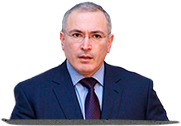
In a country where the government spits on the constitutional rights of its citizens, where there is no independent judiciary, any statute can become a form of political persecution. From this perspective, 212.1 is better than a false accusation of espionage or terrorism, in that it carries a shorter sentence. But in fact, when you consider the purpose of the law and its implementation, you see that it is the criminalization of human rights under Article 31 of the Constitution.

